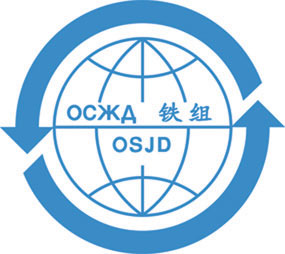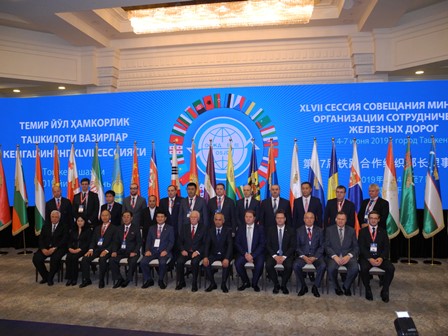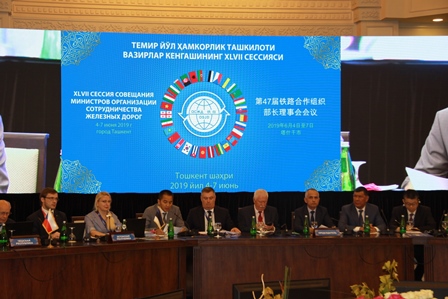Session XLVII of the OSJD Ministerial Conference

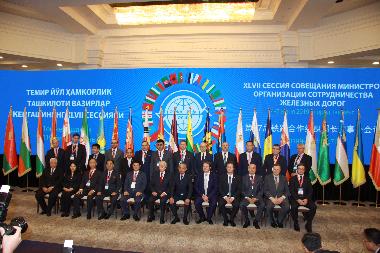
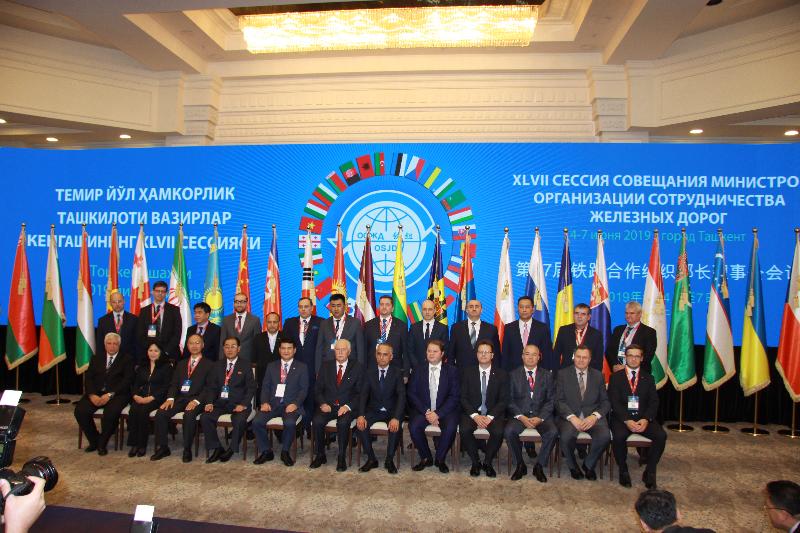
Republic of Azerbaijan, Republic of Belarus, Republic of Bulgaria, Hungary, Socialist Republic of Vietnam, Georgia, Islamic Republic of Iran, Republic of Kazakhstan, People's Republic of China, Democratic People’s Republic of Korea, Republic of Korea, Kyrgyz Republic, Republic of Latvia, Republic of Lithuania Republic of Moldova, Mongolia, Republic of Poland, Russian Federation, Slovak Republic, Republic of Tajikistan, Republic of Uzbekistan, Ukraine, Czech Republic, Republic of Estonian.
Representatives of the Eurasian Economic Commission (EAEC), the Intergovernmental Organization for International Carriage by Rail (OTIF), the International Committee of Railway Transport (CIT) and the OSJD affiliated enterprise - PLASKE JSC also took part in the Session.
The session was chaired by Mr. Khasilovdin Khasilov, the Acting Chairman of the Board of the “Uzbekiston Temir Yollari” joint stock company, and the Chairman of the OSJD Committee, Tadeusz Szozda, performed the duties of the Session Secretary.
In a welcoming address to the participants of the Ministerial Conference during the plenary meeting on 6 June 2019, Nodir Makhkamov, First Deputy Minister of Transport of the Republic of Uzbekistan, noted that railways, along with road, water and air transport, occupy a leading place in the economy of any state and are the basis for ensuring the integrity of the country’s economic space, and the railway transport plays the key role and sometimes is the only way for transporting the goods and passengers.
At the stage of modern development, Uzbekistan has undergone large-scale reforms, including those aimed at developing the sphere of transport and transport communications, at ensuring a high level of transportation safety, and at training qualified specialists. At the same time, modern trends in economic development require the formation and implementation of a unified state transport policy to ensure the availability and quality of transport services, taking into account the geographical location of the republic and the introduction of modern technologies.
To tackle the large-scale objectives related to ensuring strategic development and sustainable operation of transport communications facilities, as well as in accordance with the tasks defined in the “Action Strategy for the Five Priority Development Areas of the Republic of Uzbekistan in 2017-2021”, the country’s Ministry of Transport was established by a decree of the President of the Republic of Uzbekistan dated 1 February 2019.
The main task of the Ministry is to develop a unified state transport policy aimed at the harmonious development of all modes of transport in the Republic of Uzbekistan on the basis of their integration into a single transport network and the use of new efficient transport and logistics systems. The activities of the Ministry are aimed at pursuing a single tariff policy in the transport industry aimed at stimulating the development of the transport and logistics services market, ensuring their accessibility for all categories of consumers, as well as attracting more investments.
Meanwhile, among the tasks of the new Ministry are: development of proposals and implementation of measures aimed at the development of international transport corridors, bettering of the logistics system, effective use of the country's transport potential, and the provision of minimized costs for business entities in transport and logistics services. Considerable importance in the work of the Ministry is given to the development of public-private partnership (PPP) and to the increased investment attractiveness of the transport and road sector, the introduction of advanced information technologies for the digitalization of the entire transport system, development and implementation of the future development strategy for the Unified Interconnected Transport System of the Republic.
Nodir Makhkamov also noted that since its foundation in 1994, the “O'zbekiston Temir Yollari” JSC has been one of the structure-forming links in shaping and developing the economy of the Republic of Uzbekistan for the past 25 years.
One of the main tasks of the country’s railway administration is to meet the needs of the economy in providing timely freight and passenger traffic. The activities in this field are carried out in different directions and are aimed at ensuring safe and maximum possible throughput and carrying capacity of the railway network of the Republic of Uzbekistan.
Organisation of freight and passenger traffic, optimisation of expenses for the operation of railways, ensuring a safe train traffic is carried out in close cooperation with foreign partners, in the framework of international agreements, including the Organisation for Cooperation between Railways.
Today, the “Uzbekiston Temir Yollari” JSC is a single network of railways of the Republic of Uzbekistan with a total length of about 7,500 km, of which 2,890 km are currently electrified. At present, the current state in the development of railways and related communications provides for a maximum speed of up to 250 km/h. The locomotive fleet includes 500 electric and diesel locomotives, as well as electric and diesel multiple units. In the total volume of freight turnover of all modes of transport, the share of railway transport corresponds to 53%.
During the years of the country’s independence, more than 2,500 km have been built and more than 1,170 km of railway lines have been rehabilitated, more than 2,700 km of railway lines have been electrified. In addition, 30 stations have been built and reconstructed. The railway system of the Republic of Uzbekistan has been added by the following new and modernized railway lines:
- “Navoyi – Uchkuduk – Sultauvaizdag – Nukus” (341.6 km);
- “Tashguzar – Boysun – Kumkurgan“ (223 km);
- “Angren – Pap” (124.1 km);
- “Bukhara – Misken” (355 km);
- the railway sections “Marokand – Karshi” (140 km), “Kokand – Margilan –Andijan” (141 km), and “Karshi – Termez” (325 km) have been electrified.
In addition, in the framework of expanding cooperation with neighboring countries, the construction of a new railway line Hairaton – Mazar-i-Sharif was completed in the Islamic Republic of Afghanistan (75 km).
The railway personnel make a worthy contribution to the implementation of other construction and design works. At present, the railway builders of the “Uzbekistan Temir Yollari" JSC, who have accumulated considerable experience in the construction of railways, bridges and racks of varying complexity, have begun to implement the most complex project on laying the above-ground and underground metro using advanced world technologies. At present, three large-scale projects are being implemented in the construction of the capital’s metropolitan area - the construction of an above-ground metro line in the Sergeli and Yashnabad districts and the extension of the Yunusabad underground metro line. The implementation of these projects will create a single circular metro line covering six densely populated districts of the capital city.
In 2016-2018, in the framework of investment projects, the following major objects were commissioned:
- Construction of a new electrified railway line Angren – Pap with the electrification of the Pap-Kokand-Andijan section;
- Electrification of the Samarkand-Bukhara railway section with the organisation of high-speed passenger traffic;
- Electrification of the Karshi-Termez railway section;
- Construction of the railway line Bukhara – Misken;
- Construction of the railway line Urgench – Khiva;
- Electrification of the Karshi-Kitab railway line with the organisation of high-speed passenger traffic;
- Building reconstruction of the railway station “Tashkent-South”.
In 2011, the high-speed traffic was launched in the direction of Tashkent – Samarkand – Tashkent by means of the “Afrosiyob” passenger trains (capable of running at a speed of 250 km/h).
The implementation of the projects on the electrification of the Uzbekistan’s railways continues to go ahead. To further develop the progress in this field, as well as to improve the efficiency of passenger and freight traffic through the electrification and introduction of modern technologies, construction works are underway at the Pap – Namangan – Andijan railway section. The project is scheduled to have been completed by the end of 2021. The electrification of this section is a logical continuation of the electrified line Angren – Pap. The project implementation will make possible not only to connect the Fergana Valley with other regions of the republic. In the future, it can serve as a railway bridge between Europe and China, thus enhancing the Uzbekistan’s transit potential.
A great deal of work, the First Deputy Minister noted, is also being underway to develop the railway corridor towards Afghanistan. This year, a number of various international events and meetings with the participation of the Uzbekistan’s railway representatives are planned. Recently, the first meeting of the multilateral Working Group on the construction of transit railway lines through Afghanistan hasbeen held in Tashkent, which was attended by the representatives of the “Uzbekiston Temir Yollari” JSC, “Kazakstan Temir Zholy National Company” JSC, “Russian Railways” OJSC and the Railway Administration of Afghanistan. A number of issues have been addressed at the meeting to include the Road Map for the project implementation to build the new railway lines Mazar-i-Sharif – Herat – Kandahar – Quetta and Mazar-i-Sharif – Kabul – Peshawar (the Kabul Corridor).
It is planned that the upcoming meetings of the Working Group will also be devoted to the discussion of the project implementation “Construction of the China-Kyrgyzstan-Uzbekistan Railway”.
In order to comprehensively address the issues of increasing the volume of international freight traffic and attracting transit cargo flows through our country, active works have begun to improve the quality of services provided by transport and logistics companies in the republic. At present, in order to improve and develop transport logistics and expand the range of services provided and to improve the quality of service for freight owners, a multimodal logistics center in Andijan has been organised in Uzbekistan, which has a developed infrastructure and is equipped with modern loading and unloading equipment.
The “Ozbekiston Temir Yollari” JSC jointly with its partners continue their activities towards further development of the logistics centers in Uzbekistan. For example, the project on creation of the Uzbek-Afghan border trade center “Surkhan” sounds much interesting.
In his speech, Emil Kaikiev, Minister of Energy and Infrastructure of the EAEC, outlined the role of OSJD in the development of railway transport in the Eurasian space. The Memorandum of Cooperation signed between the two organisations is aimed at the development of railway passenger and freight traffic, increasing their competitiveness and coordinating measures to modernize the infrastructure within the international transport corridors. The main directions and stages of the transport policy were approved by the Presidents of the EAEC member countries, as a result of which the transport costs should be reduced, the freight flows will increase, the transport accessibility and mobility of the population will grow up.
Dr. Young Tae KIM, ITF Secretary General (International Transport Forum) and Mr. Küpper Wolfgang, Secretary General of OTIF, spoke about the activities of their organisations for the development of international railway traffic in the Eurasian region, which are planned to be carried out and developed further in collaboration with OSJD.
The following issues were on the agenda of the Session:
- Accession of The Republic of Korea to the Agreement on International Railway Freight Traffic (SMGS) and the Agreement on International Passenger Traffic (SMPS).
- Report on OSJD Activities for 2018.
- Report of the OSJD Auditing Commission for 2018.
- Progress of work of the OSJD Commission on Transport Policy and Development Strategy for 2018.
- Progress of work of the OSJD Commission on Transport Law for 2018.
- Amendment of the “Agreement on the organisational and operational aspects of combined transport in the traffic between Europe and Asia”.
e- Progress of work of the International Conference on the adoption of the text of the Convention on Direct International Railway Traffic.
- Information of the OSJD Committee on the progress of work carried out under the auspices of the UNECE “Towards unified railway law in the Pan-European region and in the Euro-Asian transport corridors”.
- Progress of work of the AWG on vocational training/education in the field of railway transport.
- OSJD Programme of Work for 2021 and subsequent years.
- Progress in payment of membership fees.
- OSJD Committee budget (final – for 2019, preliminary – for 2020).
- OSJD Committee residence.
- Draft provisional agenda, venue and date of Session XLVIII of the OSJD Ministerial Conference and additional information on the order schedule of the next Session of the OSJD Ministerial Conference in 2023.
Taking into account the application of the Republic of Korea to accede to the Agreement on International Passenger Traffic (SMPS) and the Agreement on International Railway Freight Traffic (SMGS), the members of the OSJD Ministerial Conference, which are both Parties to the SMPS Agreement, and the members of the OSJD Ministerial Conference, which are simultaneously Parties to the SMGS Agreement, expressed their support for the accession of the Republic of Korea to the Agreements.
The party to the SMGS and SMPS agreements from the DPRK stated the need to conduct own internal state procedures for the accession of the Republic of Korea to the SMPS and SMGS Agreements.
The Republic of Korea will send to OSJD Committee its application expressing the need to accede to the SMPS and SMGS Agreements after considering relevant issues, including the conduct of internal procedures.
The OSJD Ministerial Conference took note of the implementation of the OSJD Work Programme and Plan for 2018 and approved the Report on the OSJD Activities for 2018, the Auditing Commission Report for 2018 and the OSJD Committee Budget (preliminary - for 2020 and final - for 2019).
In the field of the transport policy and development strategy, the Ministerial Conference has taken the following decisions:
- To approve the results of work of the OSJD Commission on Transport Policy and Development Strategy for 2018.
- Take note of the information “On the implementation of the Comprehensive Plans for the Improvement of Transportation and the Development of OSJD Railway Transport Corridors Nos. 4, 6, 8 and 11 until 2020.”
- To approve the implementation of measures aimed at further development of the railway infrastructure and attracting additional freight volumes for individual sections of railway transport corridors Nos. 4, 6, 8 and 11 until 2020.
- Take note of the information on the accession of the new lines to the OSJD railway transport corridors Nos. 2, 5, 8 and 10.
The working staff of the OSJD Commission on Transport Policy and Development Strategy will make changes into the comprehensive plans and technical and operational passports of the abovementioned corridors Nos. 2, 5, 8 and 10 taking into account the connection of the new lines.
- Take note of the information on the approval of the new templates for statistical spreadsheets and explanations for their completion.
- To recommend to the OSJD member countries to provide statistical data in accordance with established terms, forms and in full volume.
- To endorse the terms developed by the Ad Hoc Working Group on Vocational Training/Education in the Field of Railway Transport for OSJD Leaflet R 305/1 “OSJD Glossary”.
- In the first half of 2020 the OSJD Commission on Transport Policy and Development Strategy shall hold a one-day Round Table on the results and plans for the reform of railway transport performed in the OSJD member countries.
In the field of the transport law, it has been decided:
- To continue working at improving the SMPS and SMGS Agreements and Service Instructions (SI) to them.
- In 2019 the OSJD Commission on Transport Law shall continue its work regarding the “Handbook. Documents regulating the international passenger traffic”.
- Временной рабочей группе Комиссии ОСЖД по транспортному праву в области Правил перевозок опасных грузов продолжить работы по актуализации Приложения 2 к СМГС в 2019 году.
- The Ad Hoc Working Group of the OSJD Commission on Transport Law in the field of the Rules for the transport of dangerous goods shall continue its work on updating of Annex 2 to SMGS in 2019
- In 2019 the Ad Hoc Working Group of the OSJD Commission on Transport Law on the development of technical conditions for stowing and fastening of goods shall continue the develop the provisions of technical conditions for stowing and securing goods in 1520-mm gauge wagons.
- To continue the work carried out by the OSJD Commission on Transport Law aimed at improving Annex 6 “Guidelines for the CIM/SMGS Consignment Note” to the SMGS Agreement within the framework of the project “Transport and Legal Harmonization of CIM/SMGS”.
- To instruct the OSJD Commission on Transport Law to update the annexes to the draft Convention “General Provisions on the Contract for the Carriage of Passengers in International Traffic”, “General Provisions on the Contract for the Carriage of Goods in International Traffic” and “General Provisions on the Transport of Dangerous Goods in International Traffic” taking into account the current versions of SMGS and SMPS.
- Take note of the information on the introduction of changes and amendments into the SMPS Agreement and SI to SMPS starting from 1 May 2019, as well as changes and amendments into the SMGS Agreement and SI to SMGS starting from 1 July 2019.
Within the framework of the preparatory meeting of the Plenipotentiary Representatives of the Members of the Ministerial Conference and the Conference of General Directors, it was decided to establish an AWG to prepare the proposals of the SMGS participants to supplement the SMGS consignment note with new functions.
The Ministerial Conference has decided to approve and implement starting from 1 July 2019 the amendments into the Agreement on the Organisational and Operational Aspects of Combined Transport in the Europe-Asia Traffic and into Annexes III and IV to the Agreement.
Regarding the work carried out for the creation of a unified railway law, the Ministerial Conference has decided as follows:
- To take note of the information provided by the OSJD Committee on the progress of work carried out by the UNECE “Towards unified railway law in the Pan-European region and in the Euro-Asian transport corridors”.
- To recommend to the interested OSJD member countries to participate in the work of the UNECE Expert Group “Towards unified railway law”.
- The OSJD Committee shall continue its participation in the work of the UNECE Expert Group “Towards unified railway law”.
As part of the activities of the AWG on vocational training/education in the field of railway traffic, the Ministerial Conference has taken the following decisions:
- To approve the progress report of the Ad Hoc Working Group on vocational training/education in the field of railway traffic for March 2018 – March 2019.
- Support the practice of conducting pilot projects and the development of typical training/education programs of an advisory nature and continue working with concerned organisations of the OSJD member countries providing education / training according to their educational / training programs of advisory nature.
- To approve the Recommendations of the OSJD Conference “Training in the field of railway transport: new challenges and opportunities for the growth of professional competencies” (22-23 October 2018, Moscow, Russian Federation).
- By 1 December 2019 the AWG shall have developed the draft Regulations on the OSJD Academy and other documents relating to its operation, in order to submit them for consideration and approval by the next Ministerial Conference, taking into account the opinion of the Conference of General Directors. The OSJD Academy shall start its activities after the Regulations on the OSJD Academy are approved.
- Establish the OSJD Academy, which will provide common approaches to the training/education of personnel on the application of OSJD documents and other regulatory acts used in the implementation of the international railway transport, including those with the participation of other modes of transport. Thereat, the expenses for the Academy’s activities shall not be funded from the budget of the OSJD Committee.
- To continue the work in the field of:
- standard training programmes of recommendatory nature on advanced training and personnel education in the application of OSJD documents;
- conducting pilot training projects in the field of application of OSJD documents by inviting concerned organisations;
- preparation of new conferences in the field of education/training.
- To provide the operation and development of the OSJD information Internet source for the popularization of the aspects relating to the vocational education/training in the field of railway transport.
- To use in further work the approved Recommendations of the OSJD Conference “Training in the field of railway transport: new challenges and opportunities for the growth of professional competencies” (22-23 October 2018, Moscow, Russian Federation).
The Ministerial Conference has approved the OSJD Programme of Work for 2020 and subsequent years in the field of transport policy and development strategy, transport law and the General Section and entrusted the OSJD Committee and the OSJD working bodies to develop the draft working plans for 2020 basing on the approved OSJD Work Programme for 2020 and subsequent years and submit them for the approval to the joint meeting of the Authorized Representatives of the members of the OSJD Ministerial Conference and the Conference of General Directors (Authorised Representatives) of OSJD railways in 2019.
It was decided to take into account the Action Plan for the implementation of Resolution No. 264 of the UNECE ITC on international passenger traffic when developing the Work Plan for 2020 of the relevant OSJD Commissions.
To recommend to the concerned OSJD member countries to carry out the corresponding procedures on the national level for acceding to the Convention on facilitation of border crossing procedures in the international carriage of passengers, luggage and goods luggage by rail.
The Ministerial Conference has decided to set Warsaw, the capital of the Republic of Poland, as the location of the OSJD Committee for the period of 2020-2024.
Session XLVII of the OSJD Ministerial Conference has decided to hold its Session XLVIII in Hungary from 9 till 12 June 2020. At the same time, the Ministerial Conference has addressed the Hungarian Party with a request to consider the possibility of holding Session XLVIII of the Ministerial Conference from 8 till 12 June 2020. The final date for Session XLVIII will be agreed at the Joint Meeting of the Plenipotentiary Representatives in December 2019.
The provisional agenda for Session XLVIII of the OSJD Ministerial Conference tentatively includes the following issues:
- Report on OSJD Activities for 2019.
- Report of the OSJD Revision Commission for 2019.
- Progress of work of the OSJD Commission on Transport Policy and Development Strategy for 2019.
- Progress of work of the OSJD Commission on Transport Law for 2019.
- Progress of work of the International Conference on the adoption of the text of the Convention on Direct International Railway Traffic.
- Information of the OSJD Committee on the progress of work carried out by the UNECE “Towards unified railway law in the Pan-European region and in the Euro-Asian transport corridors”.
- Отчёт о результатах проведённого внешнего аудита финансовой деятельности Комитат ОСЖД.
- Progress of work of the AWG on vocational education/training in the field of railway transport.
- About the OSJD Programme of Work for 2021 and subsequent years.
- Report on the outcomes of the external audit of the OSJD Committee’s financial activities.
- On the payment of membership fees.
- OSJD Committee budget (final – for 2020, preliminary – for 2021).
- Draft provisional agenda, venue and date of Session XLIX of the OSJD Ministerial Conference.
At the kind invitation of the OSJD member from the Republic of Korea, the Ministerial Conference agreed that its Session LI (51) will be held in the Republic of Korea in 2023.
The decisions taken by Session XLVII of the Ministerial Conference are aimed to further develop the railway transport in all OSJD member countries, to improve its efficiency and competitiveness, as well as to strengthen the cooperation and mutual trust between all railway administrations for the sake of economic prosperity of all states.
